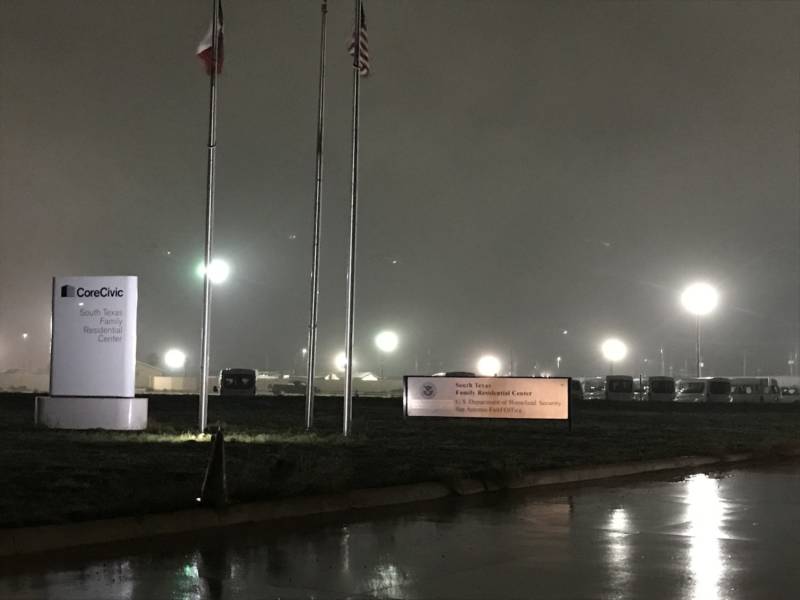“Human smugglers advertise, and intending migrants know well that even if they cross the border illegally, arriving at our border with a child has meant that they will be released into the United States to wait for court proceedings that could take five years or more,” said Acting Secretary of Homeland Security Kevin McAleenan in a press conference Wednesday, announcing the regulations that would supersede the court settlement.
The new rule will implement the major terms of the Flores agreement and establish high standards of care for children and families in custody, McAleenan added.
Immigrant advocates dispute the idea that the legal protections are spurring immigration.
“This administration has dramatically and dangerously misrepresented what the Flores Settlement Agreement is and does,” said Neha Desai, immigration director for the National Center for Youth Law in Oakland. “It’s nothing more or less than a set of bedrock child welfare principles that protect vulnerable children in fundamental ways. It doesn’t confer any immigration benefits and it doesn’t exceed any norms of child protection.”
Desai and other plaintiffs’ lawyers in the Flores case have already filed a motion with U.S. District Judge Dolly Gee in Los Angeles, calling for a permanent injunction to block the new rule from taking effect. They now have a week to submit additional legal briefs. Then Judge Gee will decide whether the regulations are consistent with the requirements of the Flores agreement.
A draft rule was released last November and drew more than 100,000 public comments. The final rule is set to take effect in 60 days, unless it is blocked by the court.
Here are three big takeaways.
1. Families Can Be Held Indefinitely
Under the new rule, Immigration and Customs Enforcement officials would be empowered to hold children and their parents in ICE Family Residential Centers, with no restriction on the length of detention.
In 2015 Judge Gee ruled, and the U.S.9th Circuit Court of Appeals affirmed, that the Flores agreement applied to all “alien minors” in government custody, including those accompanied by their parents or legal guardians. Gee added that if children were not in a state-licensed facility, they had to be released “as expeditiously as possible,” and if, as federal attorneys argued, 20 days was “as fast as [the Government] . . . can possibly go,” that was an acceptable time frame for placing children in licensed shelters.
If the rule takes effect, that time limit would no longer apply.
By ending the Flores agreement, “the new rule closes the legal loophole that arose from the reinterpretation of Flores — which Congress has refused to do — allowing the federal government to house alien families together in appropriate facilities during fair and expeditious proceedings, as was done by the previous administration in 2014 and 2015,” said McAleenan.
2. Family Facilities Will Be Licensed by the Feds
The new regulations create a federal licensing system for the Family Residential Centers (there are currently three of them, in Texas and Pennsylvania, that can house roughly 3,000 people).
Typically, group homes, foster homes and other facilities that house dependent children are licensed by state child welfare agencies. In California, the Department of Social Services has regulatory authority over children’s residential facilities. But family detention facilities don’t generally exist at the state level, so there’s no state child welfare system to regulate them.
Under the new scheme, if no state licensing is possible, the federal government would employ an independent third party to ensure the facilities meet federal standards.
Plaintiffs’ lawyers said they doubted that approach would be truly independent.
“The prospect of the Department of Homeland Security establishing its own self-licensing system is completely unacceptable and inconsistent with the Flores settlement agreement,” said Desai.
3. Legal Oversight by Children’s Advocates Will End
If the new regulations take effect, plaintiffs’ attorneys in the Flores case will no longer have the right to monitor children’s shelters, family detention centers or Border Patrol stations, as they do now.
The Flores agreement states that “Plaintiffs’ counsel may request access to any licensed program’s facility in which a minor has been placed …” Lawyers representing detained children routinely do inspect the facilities, and they’ve repeatedly brought substandard conditions to the attention of the court. Last year, Judge Gee appointed an independent monitor to report back to her on inadequate conditions for children.
The court’s oversight will end if the Flores agreement terminates.

